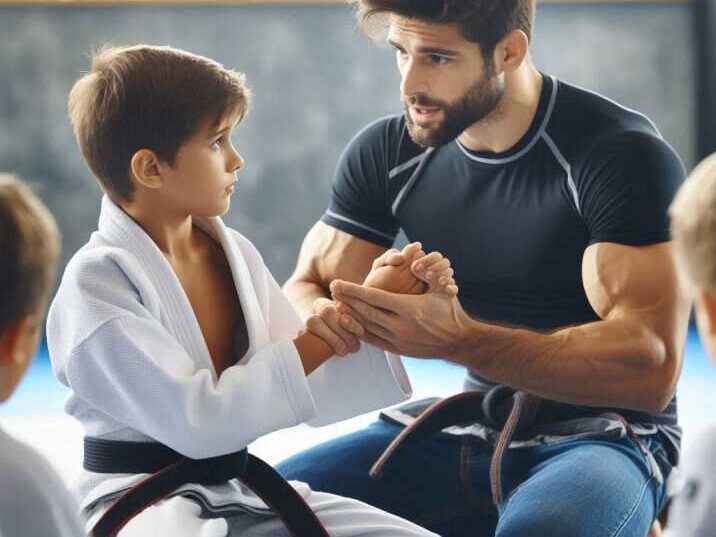Is Brazilian Jiu Jitsu Dangerous? Brazilian Jiu Jitsu (BJJ) is a popular martial art known for its ground-fighting techniques, submissions, and grappling. But is it dangerous? This question often comes, especially for beginners or parents thinking about signing up their kids. While BJJ can seem intense, like any sport, it involves risks, but there are ways to minimize them. Training Brazilian Jiu Jitsu not only teaches valuable self-defense skills but also requires concentration and discipline, which can translate to improved focus in school and other activities.

This article will explore whether Brazilian Jiu Jitsu is dangerous, focusing on safety, benefits, and precautions for beginners.
Understanding the Risks of Brazilian Jiu Jitsu
Table of Contents
Just like other contact sports, Brazilian Jiu Jitsu has its risks. However, it’s important to remember that most of these risks can be reduced with proper training, supervision, and a focus on safety. Below, we’ll explore some of the potential dangers in BJJ training.
1. Common Injuries in Brazilian Jiu Jitsu
Injuries in BJJ often come from accidents or incorrect techniques. The most common injuries include:
- Sprains and strains (especially in the knees and shoulders)
- Bruises from grappling
- Dislocated joints or minor bone injuries
Proper warm-up exercises and stretching can help prevent these injuries. Students are also taught to “tap out” or submit if they’re uncomfortable position, which greatly reduces the risk of serious injury.
2. Tapping Out – A Key Safety Measure
In Brazilian Jiu Jitsu, tapping out is a fundamental safety mechanism. When students feel trapped or uncomfortable, they tap the ground or their opponent, signaling that they want the action to stop. This prevents injuries, particularly during submission holds, and encourages respect and control in practice.
How Safe is Brazilian Jiu Jitsu for Beginners?
While injuries can happen, BJJ is considered relatively safe when compared to other martial arts like boxing or kickboxing, where strikes to the head and body are common. Brazilian Jiu Jitsu focuses on leverage, control, and submissions, which means there is less risk of head injuries, like concussions.
3. The Role of a Good Instructor
A skilled and experienced instructor is essential to keeping BJJ safe for beginners. A good instructor will:
- Teach proper techniques
- Ensure that students practice with control
- Monitor sparring sessions closely to prevent accidents
4. Safety Gear in BJJ
Though Brazilian Jiu Jitsu does not involve striking, some protective gear can further reduce the risk of injury. For example:
- Mouthguards protect teeth and gums during sparring.
- Knee pads provide cushioning for grappling on the mat.
- Ear guards help prevent “cauliflower ear,” a condition common in contact sports.
Can Brazilian Jiu Jitsu Improve Focus and Discipline?
Aside from safety, Brazilian Jiu Jitsu has several benefits that make it a great activity for kids and adults alike. One of the biggest benefits is its impact on focus and discipline.
5. BJJ Improves Focus and Concentration
Learning and practicing the techniques of BJJ requires a high level of concentration. Students need to pay close attention to their movements and their opponent’s actions. This ability to focus during training often translates to other areas of life, such as school or work.
6. Discipline Learned Through Brazilian Jiu Jitsu
BJJ also teaches discipline. Students are taught to respect their opponents, instructors, and the rules of the sport. The structure of regular practice sessions helps students develop discipline, set goals, and work toward improving their skills over time.
Brazilian Jiu Jitsu Safety Tips for Beginners
For those starting Brazilian Jiu Jitsu, here are some important safety tips to remember:
7. Warm Up Properly
Always warm up before training to reduce the risk of muscle strains and injuries.
8. Learn to Tap Out Early
One of the first things beginners should learn is how to tap out. This is essential for preventing injury and maintaining control during training.
9. Train with Partners at Your Level
When sparring, try to partner with someone of a similar experience level. Training with more advanced students can lead to a higher risk of injury if you don’t yet know how to defend yourself properly.
10. Practice Control
Remember that BJJ is not about strength or aggression. It’s about control, technique, and leverage. Always practice with care for your training partner’s safety.
Table: Comparing Brazilian Jiu Jitsu Safety with Other Martial Arts
| Martial Art | Focus | Common Injuries | Safety Rating |
|---|---|---|---|
| Brazilian Jiu Jitsu (BJJ) | Grappling, submissions | Joint strains, bruises | High |
| Boxing | Striking | Concussions, broken noses | Moderate |
| Muay Thai | Kicks, punches | Bruises, fractures | Moderate |
| Judo | Throws, grappling | Joint injuries, bruises | High |
Conclusion: Is Brazilian Jiu Jitsu Dangerous?
Brazilian Jiu Jitsu, like any sport, comes with risks. However, with proper training, a focus on safety, and the guidance of a good instructor, BJJ is a relatively safe martial art. Not only does it help improve physical fitness, but it also teaches discipline, focus, and self-control, which can benefit students both on and off the mat.
FAQs
1. Is Brazilian Jiu Jitsu dangerous for kids?
No, Brazilian Jiu Jitsu is generally safe for kids as long as they are properly supervised and taught by a qualified instructor.
2. Can BJJ cause serious injuries?
Serious injuries are rare in BJJ. Most injuries are minor, such as bruises or joint strains, and can be avoided with proper technique and safety precautions.
3. What safety gear do I need for Brazilian Jiu Jitsu?
The most common safety gear includes a mouthguard, knee pads, and ear guards to protect against injuries.
4. How can Brazilian Jiu Jitsu improve focus?
BJJ requires intense focus on techniques and strategies, helping students improve concentration skills that can translate to other activities, like school.
5. What is the most important thing to remember in BJJ for beginners?
The most important thing to remember is to tap out when you’re in an uncomfortable or dangerous position. This helps prevent injuries and ensures safe training.


